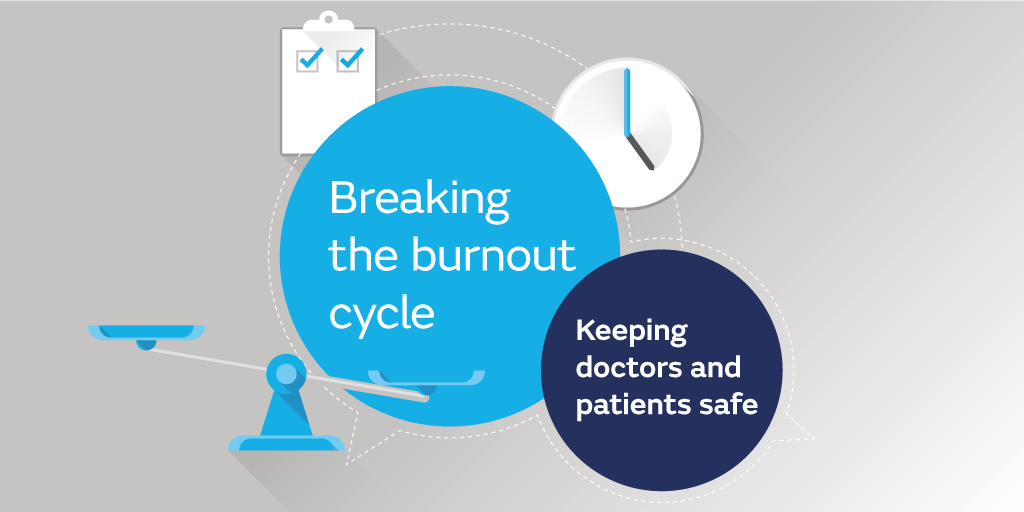Avoiding burnout as a practice manager
Post date: 29/06/2023 | Time to read article: 5 minsThe information within this article was correct at the time of publishing. Last updated 29/06/2023
General practice is under increasing strain, causing greater pressure on the whole practice team. Medical Protection explores the greatest causes of stress amongst practice managers, and offers tips on how to increase resilience and avoid burnout.
Practice managers are essential to the safe and effective running of a GP surgery. They contribute in a hundred untold ways, taking care of all the behind-the-scenes details, big and small, that keep the doors open, lights on, equipment stocked, doctors paid, and patients flowing.
But, while GP burnout has been a pressing concern in the NHS for some time, little is being said about the effect that increasing demand and ever-shrinking resources are having on practice managers.
A 2017 survey by Practice Index of GP practice managers painted a bleak picture. It suggested that almost all GP practice managers feel “overloaded” and well over a quarter are actively planning to quit.
How overloaded are you as a practice manager?
9.7% Significantly, and I am actively planning on leaving the NHS.
41.0% Significantly, but I will stay and struggle on.
21.4% Completely, but I will stay and struggle on.
17.5% Completely, and I am actively planning on leaving the NHS.
7.8% Moderately overloaded.
1.9% Not overloaded.
0.7% None of the above, but I’m leaving the NHS. I’ve had enough.
Increased regulation
The increased stress and overwork appears to be coming from multiple directions. Rachel Arkieson, Managing Partner at Drayton Medical Practice in Norwich, believes that much of it is caused by the increase in regulation.
“Regulation has brought more complexity to the health service,” she said. “It involves a whole load more administration and man hours to keep up-to-date with all the evidence and things we have to do in order to demonstrate we’re providing safe and proper care.”
One of the biggest stressors on her practice has been in preparing for their CQC inspection. The practice prepared for six months in advance of the inspection, with the final two weeks being particularly hectic.
“It was a phenomenal workload. In the build up to the inspection I worked every evening and gave up my bank holiday because there was so much to do,” she said.
She added that, in her opinion, the pressure and workload put on a practice by CQC visits is “disproportionate”, and said there are better ways to assess whether a practice is providing safe care.
Laura Anne McMahon, Business Manager at St Luke’s Medical Practice in Lanarkshire, also identified regulation as a stressor, but from a different source than the CQC.
She said: “The pension regulations have put a tremendous amount of pressure on me. Not just from trying to make sure we’re compliant, but also as a result of the new auto-enrolment requirements. I think it has caused anxiety and stress amongst practice managers across Scotland.”
Mrs Arkieson added that HR regulation is also “hugely frustrating”.
GP Recruitment
Mrs McMahon pointed to recruitment, specifically a lack of available GPs, as her number one stressor.
“The recruitment element is really stressful. Trying to get cover for GPs when they have annual leave or need to go to court − it’s so difficult. When I first started you had a pick of locums and they were quite happy with your sessional rate, but now it’s impossible.”
Both Mrs Arkieson and Mrs McMahon said that they work longer than their contracted hours each week. Mrs McMahon, who is contracted for a 30-hour week, often works up to a third of that again, and both often work at home on evenings and weekends.
“I don’t know any practice manager who pops in at nine in the morning and goes home at four in the afternoon – if they are doing that then they’re probably working at home as well,” Mrs Arkieson said.
Email was also a stressor identified by both practice managers; they warn that it can take over your life if you’re not careful. Mrs McMahon believes it is important to set boundaries and not access work emails outside of working hours.
“I feel that if I did that, I would never switch off. I know managers who pick up emails on the phone and on annual leave, but I don’t. When I’m on holiday, I’m on holiday, when I’m not in the practice, I’m not in the practice,” she said.
Dealing with stress
Exercise is a solution employed by both practice managers to cope with stress, whether that’s running, exercise classes or team sports. Mrs Arkieson also said it was important to be open with your GP partners about what is going on.
“I think having honest conversations with the partners about what they actually expect of this ‘superhuman’ practice manager is very important. I do think doctors sometimes have unrealistic expectations. When you do know what’s expected of you, then it’s much easier to control your environment.”
Mrs McMahon stressed the importance of meeting regularly with her counterparts from other practices. She said that meeting with a group of them for lunch every few months is a great source of support. She also finds it invaluable being able to contact them for advice on difficult issues, as usually another practice in the locality will have faced something similar before.
Emotional resilience
When dealing with stress and overwork, emotional resilience becomes very important. This is the ability to take on life’s pressures while still being able to function. It is an ability which can be learnt and, when used, can aid in some of the most challenging situations.
HR experts Croner offer resilience advice as part of their support package to businesses. Nikki Mays, Partnerships Manager at Croner, said: “Emotional resilience in the workplace allows us to cope with pressure and, at times, even enjoy it.
“Resilience does not eliminate stress or erase life’s difficulties, but allows you to tackle or accept problems, live through adversity and move on with life.
“While resilient people do not allow adversity to define them or their lives, less resilient people have a harder time with stress and life changes. However, being rigidly ‘strong’ without flexibility may be unhelpful, leading to ‘stress fractures’.
"Some of the key elements of enacting resilience are self-awareness, understanding how you feel and when things are getting too much, and ensuring you self-care.”
Croner's top 10 tips for creating resilience
1. Continue to maintain close relationships with friends and families. This is one of the first things to suffer, however, studies prove that making the effort to maintain these relationships during hard times will help you endlessly in the long run.
2. Avoid seeing it as a crisis. It is so easy to react and overreact when the pressure is on. This can make things seem and feel worse. As soon as you believe something is unbearable it will become unbearable. Pull yourself back when you hear yourself catastrophising a situation.
3. Some things cannot be changed. We can often focus on where we want there to be change, even though we have no ability or power to do so. There is nothing worse than worrying about things you have no control over. Divert that energy to what can be changed. Always look at the bigger picture.
4. Goal setting. Identify small realistic goals that can be achieved. Accomplish them and you will start regaining a feeling of control.
5. Think about the long term. We often feel the most pressure from the things affecting us right now. The reality is that this pressure will not stay with you for the rest of your life. Think about the long term. This can be hard to do, however, acknowledging a light at the end of the tunnel will give more power to your resilience.
6. Make a point to be positive. The brain learns habits. If you can make a point of saying something positive about a situation you will start to automatically be more positive in a time of crisis.
7. Get organised and look after yourself. Eat ‘five-a-day’, sleep, switch off, exercise and take time for yourself. We hear this all the time but those who choose not to follow the advice will suffer from stress and, at times, a lack of resilience that can have consequences to their health, wellbeing and relationships. Listen to the advice.
8. Use relaxation techniques or indulge in activities that make you feel relaxed. There are many apps and books to help you relax, but you can just take a bath, or read a book – something you know relaxes you normally.
9. Try a new hobby or interest. Why not take up a completely new hobby which will take you away from the things that are causing you stress?
10. Practise being honest and confident when communicating with others. If you think people are making unreasonable demands on you, try to tell them how you feel and say no.



